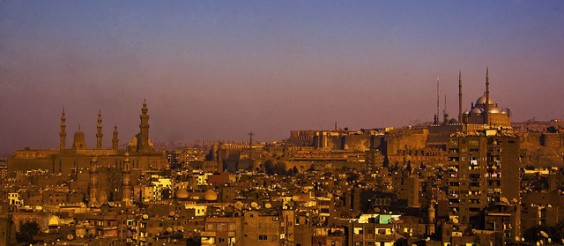Egypt’s New Clothes
by Nesreen Salem / April 1, 2015 / No comments

The sun sets over Egypt's current capital, in Cairo. Photo via Flickr user: Marwa Morgan
Rather than fix Cairo, the Economic Forum proposes moving Egypt’s capital to the desert near El Ein el Sokhna.
Recently, a rumor that Egypt’s capital will move to a new location has been spreading. The Emperor was to acquire new clothes, as it were. To many, this seemed like another Egyptian quip, deriding the idea that the only way the current government could fix Egypt’s problems was to start from scratch. But recently, the Economic Forum held in Sharm El Sheikh gagged all jest with the announcement that “scratch,” indeed would be a location in the desert near El Ein el Sokhna: that’s where they would start and Egypt’s problems will end. President el Sisi unveiled what “scratch” will look like to a host of plutocrats and private investors: a pristine, futuristic dream – a mimic of Dubai or Singapore – yet to be named.

- A Thousand and One Cries will use a literary edge to reflect on Middle Eastern cultural and political trends, paying special attention to the condition of women and other minorities in Egypt.

- Nesreen Salem writes fiction and commentary on political and cultural affairs in Egypt and the Middle East. Although her heart is in Alexandria, the city of her birth, she lives in England. There, she works as the Egyptian Feminist Union’s UK Coordinator and a Ph.D. candidate at the University of Essex. Her field of research includes history, feminism, myths, legends, and fairy tales. Currently, she is writing her first novel and a collection of poetry.
So it appears that Cairo’s problems (the current capital of Egypt, which will lose its status in the next five to seven years) have become too overwhelming, even for a national hero. Or perhaps Cairo is not worthy of the time and effort required to resolve its problems, to the extent that it has been deemed easier – and cheaper – to invest $80 billion on an entire new wardrobe for Egypt in the shape of a new, currently invisible, city. But it promises to be a wardrobe fit for an Emperor.
How will creating a new capital for Egypt fix the inherent and accumulated urban mess that exists not only in Cairo, but every city and town in Egypt? It seems that this is not the question to ask. If you question the logic behind seeing how exquisite the Emperor’s new clothes are, it will most certainly mean that you are too dimwitted to grasp the sensational marvel that are his invisible new clothes.
Once upon a time, Alexandria, my birthplace, was the proud capital of Egypt when Alexander the Great deemed it so in 332 BCE. It was a city worthy of its status, for it served as the center of all Hellenic scholarship and research. It housed the most important library at the time: the Library of Alexandria, where every piece of knowledge worth knowing to mankind was kept in manuscript form upon its shelves. Until it surrendered to Arab forces led by Amr Ibn el As in 642 AD, Alexandrian society was a fusion of eclectic artistic, scientific and academic minds; a Mediterranean Atlantis.
I imagine the Arabs decided to move the capital to Cairo – a name that means “the oppressor” in Arabic – to clothe Egypt in its new Arabic and Islamic character (the new status quo). Indeed, Cairo wears its Islamic history proudly as it stands alongside the pyramids, sphinx and whatever is left in the Egyptian museum. I imagine Cairo in its first few years as a novel capital; young, proud, feverish with the vitality of new life, growing up to be the new center of an Islamic empire that stretched its hands and legs through Europe, Asia and Africa. I also imagine Alexandria withering and wrinkling as its people leave it to seek greener pastures elsewhere, taking its essence with them.
It is reasonable to ask: what about the existing infrastructural problems in Cairo and elsewhere? Only a tiny percentage has the luxury or wealth to move to a capital city designed to be another capitalist playground. It is also reasonable to ask: what new era is this new capital ushering in for Egypt, a place already entrenched in the wretchedness of an ever-expanding gap between the rich and the poor?
In a millennium’s time, will Egyptians look back upon this era as one that brought on the progress of people’s dreams? Or will the episode be another story in the book of logical fallacies?




